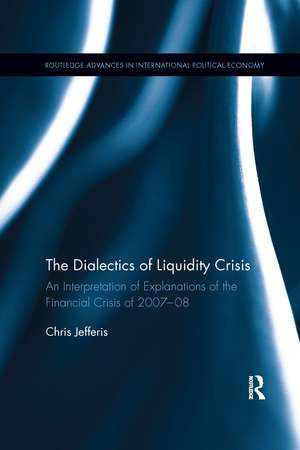The Dialectics of Liquidity Crisis: An interpretation of explanations of the financial crisis of 2007-08: Routledge Advances in International Political Economy
Autor Chris Jefferisen Limba Engleză Paperback – 30 sep 2021
The book argues that explanation of the financial crisis of 2007–08 should involve interpretation of the concept of 'risk', which guides the construction and pricing of contemporary financial products such as derivatives and asset backed securities, as a form of 'liquidity', the concept that Minsky sought to explain the financial crises of the 1970s and 1980s with. The book highlights the continuing relevance of Minsky’s theory of liquidity crisis as "immanent", in a historical sense, to the products and trading practices of modern finance, because these products were developed to obviate the crisis dynamics that Minsky described. Minsky's FIH can therefore inform historical understanding of the crisis of 2007–08 but is not directly explanatory itself. The book explores explanation of the financial crisis of 2007–08 interpreting 'liquidity', in practical historical terms, as involving a process of development out of prior crisis dynamics.
Seeking to contribute to debates over the causes of the financial crisis of 2007–08 by blending a discussion of historicizing philosophy, economic theory and contemporary financial banking and trading practices this work will be of great interest to scholars of international political economy, heterodox economics and critical theory.
| Toate formatele și edițiile | Preț | Express |
|---|---|---|
| Paperback (1) | 379.68 lei 6-8 săpt. | |
| Taylor & Francis – 30 sep 2021 | 379.68 lei 6-8 săpt. | |
| Hardback (1) | 873.11 lei 6-8 săpt. | |
| Taylor & Francis – 24 feb 2017 | 873.11 lei 6-8 săpt. |
Din seria Routledge Advances in International Political Economy
-
 Preț: 419.11 lei
Preț: 419.11 lei -
 Preț: 387.38 lei
Preț: 387.38 lei -
 Preț: 394.51 lei
Preț: 394.51 lei -
 Preț: 408.00 lei
Preț: 408.00 lei -
 Preț: 380.74 lei
Preț: 380.74 lei - 45%
 Preț: 159.66 lei
Preț: 159.66 lei -
 Preț: 410.50 lei
Preț: 410.50 lei -
 Preț: 485.24 lei
Preț: 485.24 lei -
 Preț: 189.55 lei
Preț: 189.55 lei -
 Preț: 482.74 lei
Preț: 482.74 lei - 16%
 Preț: 313.40 lei
Preț: 313.40 lei -
 Preț: 366.68 lei
Preț: 366.68 lei -
 Preț: 446.53 lei
Preț: 446.53 lei -
 Preț: 282.62 lei
Preț: 282.62 lei - 17%
 Preț: 245.11 lei
Preț: 245.11 lei - 18%
 Preț: 1055.51 lei
Preț: 1055.51 lei -
 Preț: 481.79 lei
Preț: 481.79 lei - 19%
 Preț: 216.07 lei
Preț: 216.07 lei - 21%
 Preț: 255.84 lei
Preț: 255.84 lei -
 Preț: 198.19 lei
Preț: 198.19 lei - 18%
 Preț: 1010.60 lei
Preț: 1010.60 lei - 13%
 Preț: 295.91 lei
Preț: 295.91 lei -
 Preț: 447.72 lei
Preț: 447.72 lei -
 Preț: 464.16 lei
Preț: 464.16 lei - 31%
 Preț: 763.39 lei
Preț: 763.39 lei -
 Preț: 278.13 lei
Preț: 278.13 lei
Preț: 379.68 lei
Nou
Puncte Express: 570
Preț estimativ în valută:
72.67€ • 78.97$ • 61.09£
72.67€ • 78.97$ • 61.09£
Carte tipărită la comandă
Livrare economică 21 aprilie-05 mai
Preluare comenzi: 021 569.72.76
Specificații
ISBN-13: 9781032179216
ISBN-10: 103217921X
Pagini: 148
Ilustrații: 1 Illustrations, black and white
Dimensiuni: 156 x 234 x 8 mm
Greutate: 0.22 kg
Ediția:1
Editura: Taylor & Francis
Colecția Routledge
Seria Routledge Advances in International Political Economy
Locul publicării:Oxford, United Kingdom
ISBN-10: 103217921X
Pagini: 148
Ilustrații: 1 Illustrations, black and white
Dimensiuni: 156 x 234 x 8 mm
Greutate: 0.22 kg
Ediția:1
Editura: Taylor & Francis
Colecția Routledge
Seria Routledge Advances in International Political Economy
Locul publicării:Oxford, United Kingdom
Public țintă
Postgraduate and UndergraduateCuprins
1. Introduction: historicizing economic theories of financial crisis
2. Minsky in context: a critique of "liquidity crisis" as an explanatory concept
3. Minsky contrary to Monetarism
4. Liquidity and abstraction
5. Arbitrage as a historical structure shaping the US financial system
6. Sociological interlude: calculation or commensuration
7. Recent financial instability in the US mortgage market: the three phases of risk
8. Economics, regulation and capital: an assessment of some proposed reforms
9. Conclusion
10. Bibliography
2. Minsky in context: a critique of "liquidity crisis" as an explanatory concept
3. Minsky contrary to Monetarism
4. Liquidity and abstraction
5. Arbitrage as a historical structure shaping the US financial system
6. Sociological interlude: calculation or commensuration
7. Recent financial instability in the US mortgage market: the three phases of risk
8. Economics, regulation and capital: an assessment of some proposed reforms
9. Conclusion
10. Bibliography
Notă biografică
Chris Jefferis is post-doctoral research fellow in the Department of Political Science at Freie Universität’s John F. Kennedy Institute for North American Studies. He is also a joint recipient of an Institute for New Economic Thinking (INET) research grant analysing 'Financial Innovation and Central Banking in China: A Money View'.
Descriere
This book analyses the logic of applying the American Post-Keynesian economist Hyman Minsky’s Financial Instability Hypothesis (FIH) to the financial crisis of 2007-08. In conducting a historicizing critique of Minsky’s work this book seeks to illustrate how the abstraction of financial "risk" which conditions trade in financial instruments such













